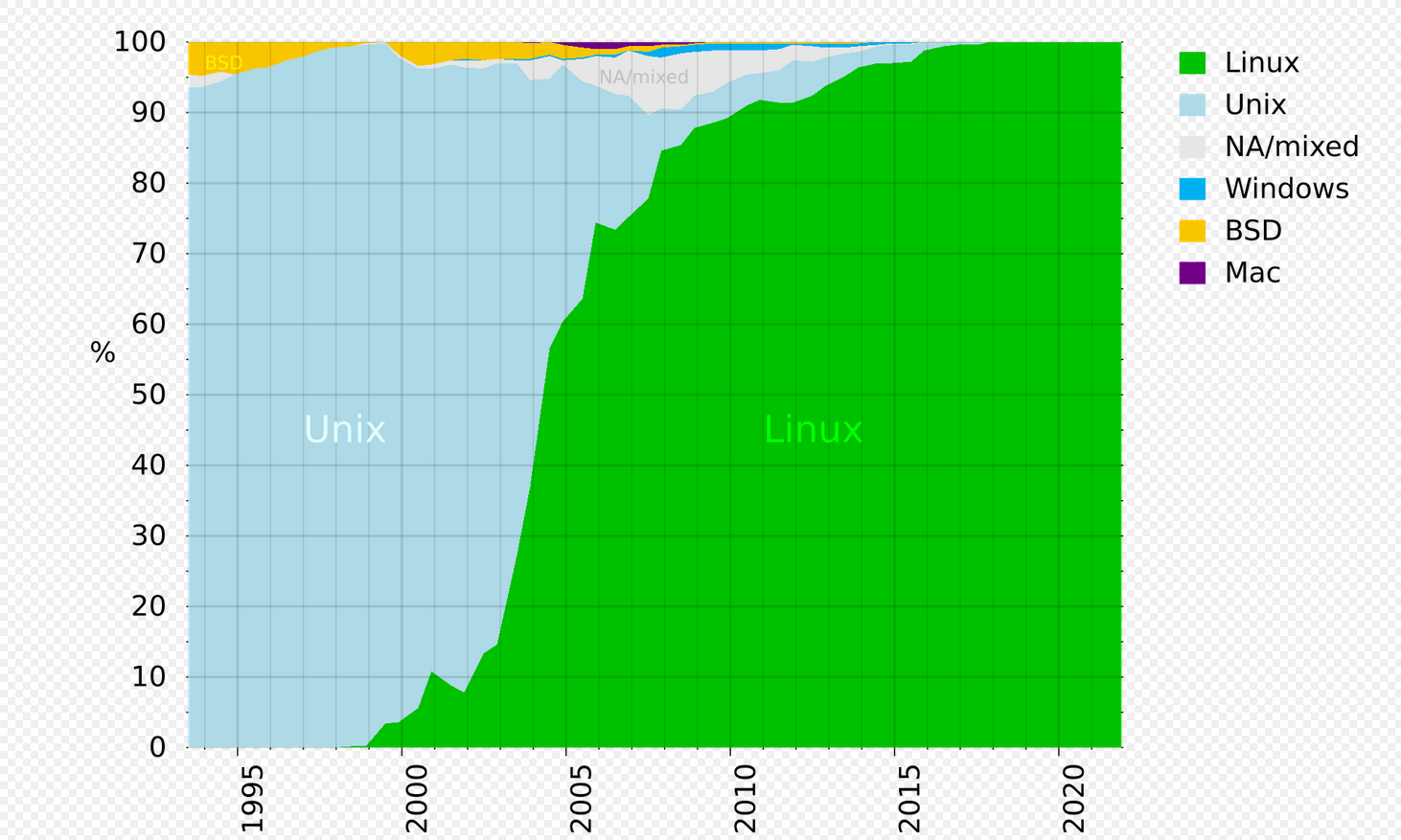Interesting how the tiny BSD fraction had a lead over Linux in 1995
Linux
From Wikipedia, the free encyclopedia
Linux is a family of open source Unix-like operating systems based on the Linux kernel, an operating system kernel first released on September 17, 1991 by Linus Torvalds. Linux is typically packaged in a Linux distribution (or distro for short).
Distributions include the Linux kernel and supporting system software and libraries, many of which are provided by the GNU Project. Many Linux distributions use the word "Linux" in their name, but the Free Software Foundation uses the name GNU/Linux to emphasize the importance of GNU software, causing some controversy.
Rules
- Posts must be relevant to operating systems running the Linux kernel. GNU/Linux or otherwise.
- No misinformation
- No NSFW content
- No hate speech, bigotry, etc
Related Communities
Community icon by Alpár-Etele Méder, licensed under CC BY 3.0
Ah hahahaha!!!!
Windows! Some dumbass put Windows on a supercomputer!
Prob Microsoft themselves
Ironically, even Microsoft uses Linux in its Azure datacenters, iirc
They use a mixture of Windows and Linux. They do use Linux quite a bit, but they also have a lot of Hyper-V servers.
True. Never meant to say they use Linux exclusively; thanks for clarification anyway!
Probably need one, just for the benchmark comparisons.
I saw the thumbnail and thought this was a map of The Netherlands
"Is your UNIX Linux compatible?"
Surprised to learn that there were windows based Supercomputers.
Those were the basic entry level configurations needed to run Windows Vista with Aero effects.
So basically, everybody switched from expensive UNIX™ to cheap "unix"-in-all-but-trademark-certification once it became feasible, and otherwise nothing has changed in 30 years.
Except this time the Unix-like took 100% of the market
Was too clear this thing is just better
So you're telling me that there was a Mac super computer in '05?
https://en.wikipedia.org/wiki/System_X_(supercomputer)
G5
Oof, in only a couple years it was worthless.
Also known as Big Mac
haha
Wait what Mac?
The Big Mac. 3rd fastest when it was built and also the cheapest, costing only $5.2 million.
Interesting. It's like those data centers that ran on thousands of Xboxes
Now the real question is what package manager are they using? apt or yum? Lol
Wow, that's kind of a lot more Linux than I was expecting, but it also makes sense. Pretty cool tbh.
As someone who worked on designing racks in the super computer space about 10 q5vyrs ago I had no clue windows and mac even tried to entered the space
about 10 q5vyrs ago
Have you been distracted and typed a password/PSK in the wrong field 8)
There was a time when a bunch of organisations made their own supercomputers by just clustering a lot of regular computers:
https://en.wikipedia.org/wiki/System_X_(supercomputer)
For Windows I couldn't find anything.
If you google "Windows supercomputer", you just get lots of results about Microsoft supercomputers, which of course all run on Linux.
Maybe windows is not used in supercomputers often because unix and linux is more flexiable for the cpus they use(Power9,Sparc,etc)
That's certainly a big part of it. When one needs to buy a metric crap load of CPUs, one tends to shop outside the popular defaults.
Another big reason, historically, is that Supercomputers didn't typically have any kind of non-command-line way to interact with them, and Windows needed it.
Until PowerShell and Windows 8, there were still substantial configuration options in Windows that were 100% managed by graphical packages. They could be changed by direct file edits and registry editing, but it added a lot of risk. All of the "did I make a mistake" tools were graphical and so unavailable from command line.
So any version of Windows stripped down enough to run on any super-computer cluster was going to be missing a lot of features, until around 2006.
Since Linux and Unix started as command line operating systems, both already had plenty fully featured options for Supercomputing.
Plus Linux doesn't limit you in the number of drives, whereas Windows limits you from A to Z. I read it here.
